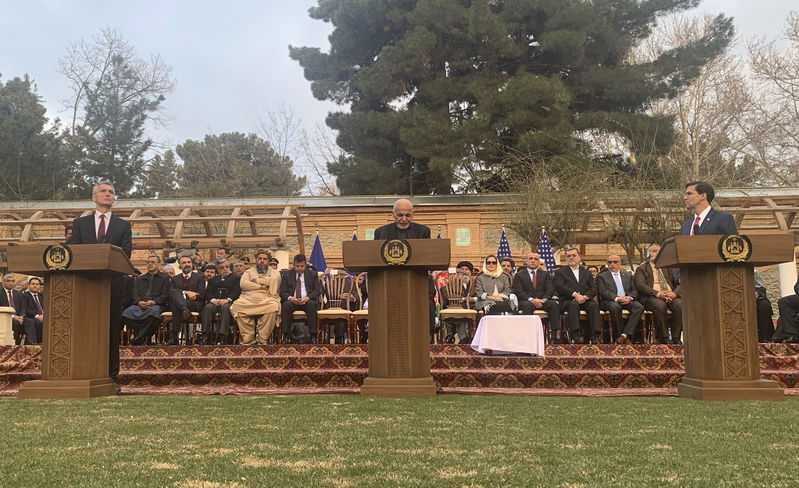Afghan deal is boost for Trump but pullout does take time
02 March, 2020

U.S. President Donald Trump’s quest for a second term received a boost on Saturday from a handle the Taliban for a troop pullout from Afghanistan, nonetheless it could devote some time - possibly years - before all U.S. forces come home from America’s longest war.
The fruit greater than a year of on-and-off talks, the agreement, signed in Doha on Saturday, lets Trump claim a major foreign policy success, a prize which has eluded him on North Korea, Venezuela, Iran and other priorities.
The accord, however, faces numerous potential obstacles, such as for example sabotage by spoilers like dissident Taliban commanders.
Even though the Republican president or a successful Democratic challenger in the Nov. 3 U.S. election could order a complete pullout before peace is secured, that could risk a Taliban takeover and a resurgence of Al-Qaida Islamist militants that could need a new U.S. intervention.
“A complete withdrawal of U.S. forces raises the opportunity that Afghanistan can be another safe haven for terrorist organizations under a Taliban government,” said Seth Jones, a former adviser to U.S. special forces in Afghanistan with the guts for Strategic and International Studies thinktank. “The Taliban continue steadily to have a close relationship with Al-Qaida.”
The accord signed in Qatar demands a long-planned initial drawdown to 8,600 U.S. troops from some 13,000 within 135 days. Nonetheless it ties further decreases to the Taliban doing things they may find difficult, especially cutting decades-old ties with Al-Qaida and other militant groups so deep they include inter-marriages.
“Our commitment to do something on the drawdown is tied to Taliban action on their commitments in the agreement, which include at length the counter-terrorism commitments,” said a senior Trump administration official, speaking on condition of anonymity. “We are the ones who look at what the Taliban do and determine whether they’re meeting their commitments.”
U.S. officials also stressed that the pace of the drawdown is determined by progress in so-called intra-Afghan peace talks due to follow Saturday’s signing.
“The core trade, if you will, is action on CT [counter-terrorism] for drawdown,” said the administration official. “However the agreement also calls on them [the Taliban] to enter negotiations, be seriously interested in those negotiations,” including seeking an early “comprehensive and permanent ceasefire.”
U.S. Defense Secretary Mark Esper said in Kabul on Saturday that america would remain focused on Afghan security forces and while the signing of the historic accord was an excellent step, the street ahead wouldn't normally be easy.
“That is a hopeful moment, nonetheless it is only the start. The road ahead will never be easy. Achieving lasting peace in Afghanistan will demand patience and compromise among all parties,” Esper said while standing next to Afghan President Ashraf Ghani and NATO Secretary General Jens Stoltenberg.
“If the Taliban uphold the agreement, america will get started a conditions-based, and I repeat conditions-based, decrease in forces,” Esper said.
He added if the Taliban did not live up to commitments, the United States wouldn't normally hesitate to nullify the agreement.
In Doha, U.S. Secretary of State Mike Pompeo said the Taliban must keep its promise to cut ties with Al-Qaida and keep fighting Islamic State. He also known as on the group to embrace progress achieved by women and girls since 2001.
Some specialists warn that the peace negotiations - because of open in Oslo by March 10 - could drag on for a long time as a result of the Afghan parties’ profound ideological and political differences.
Even before getting to talks with the Taliban, the country’s two main political rivals, President Ashraf Ghani and LEADER Abdullah Abdullah, must settle a long-running dispute over which officials, opposition members and civil society activists to mention to negotiate with the insurgents.
That process was further complicated last month when both Ghani and Abdullah claimed to have won a disputed Sept. 28 election.
The necessity that the Taliban cut ties with Al-Qaida may be among the agreement’s hardest provisions to implement and - for U.S. intelligence - verify.
Al-Qaida members have married into Taliban families, trained their fighters and revel in protection under Pashtun tribal code, authorities say.
A US report in January said Al-Qaida representatives have already been shuttling between various factions of the Taliban and field commanders, urging them to reject negotiations with the Afghan government and promising to improve financial support.
“If a peace agreement is reached, Al-Qaida intends to build up a fresh narrative to justify continuing armed conflict in Afghanistan,” said the report, which estimated there are up to 600 Al-Qaida fighters there.
The accord applies and then Taliban-held territory rather than sanctuaries the insurgents have enjoyed for decades in neighboring Pakistan, where their leaders are thought to maintain ties with Al-Qaida and other militants.
Source: the-japan-news.com
